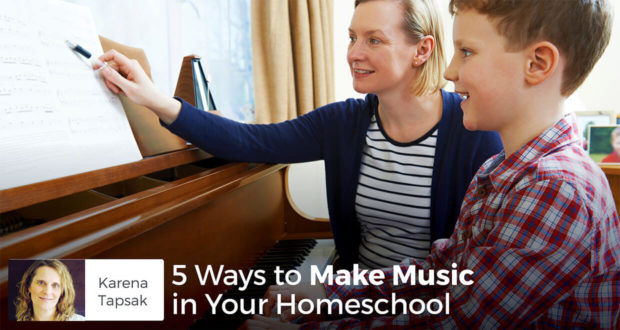Summary
Extracurricular activities? Veteran homeschooler and musician Karena Tapsak gives practical and fun ways to integrate music into your homeschool curriculum.It’s that time of year again when extracurricular activities start up as you gear up to go back to school.
It can be overwhelming trying to decide which activities justify time away from your home and family life. Music is actually easy to integrate into your day and there are so many benefits.
You have perhaps heard some of the research indicating that studying music increases intelligence, creativity and motor skills.
But there is so much more!
Anyone who studies music learns the value of hard work and reward that comes from practice and performance, as well as increased self-esteem.
Playing music is enjoyable and brings others joy. And finally, it’s a talent that, once learned, you will have for a lifetime.
The best of all? It is easy to integrate into your homeschool. You and your children will benefit, and they will thank you for it!
I have been a musician my entire life, and I am so thankful to my parents for instilling in me this love of music. I started piano at age four, and by middle school I was playing several different instruments in the school band and orchestra, as well as singing every chance I got.
My husband also grew up playing a lot of music, starting on piano, and teaching himself some electric bass and accordion. Growing up, I engaged in lots of musical listening and appreciation of classical, traditional, jazz, and others.
From attending symphony and choral concerts, our own performances, and even my dad’s “dance jobs” where he played traditional German music, we learned a lot about how important and enjoyable music can be. You can integrate music into your homeschool in the same ways.
1. Private Lessons
Taking private lessons is probably the most obvious, and perhaps easiest, solution. Lessons take little time (perhaps 15-30 minutes once a week for beginners), and practice each day (5-10 minutes for the youngest kids, progressing to more time daily as they get older).
But before you launch into private lessons, you should think about the following: How do you choose an instrument? At what age should you begin? What are your goals for musical education?
Many families start formal study with the piano, and there are good reasons to do so.
First, because of its popularity, piano teachers are relatively easy to find. Secondly, you only need to buy or lease one instrument if all of the children learn piano. I have seen many homeschooling families do this.
And finally, because playing piano develops many skills at once, learning another instrument or singing is so much easier after having studied piano. I found this to be true both for myself and my own children. Many children can begin piano lessons around the age of five or six.
Talk to a piano teacher about his/her recommendations and perhaps have him/her meet your child to determine readiness. Young children are remarkably good at learning the complexities of music at a young age, so start young if possible.
If you choose a band or orchestra instrument, you can often get private lessons through the local public or private school (if you have equal access laws in your state), or through a private preparatory school or studio.
Most schools begin band instrument lessons around the age of ten, simply because the child has to be big enough to hold and play the instrument. With string instruments, one can start younger because smaller versions of the string instruments exist and children trade up in size as they grow.
2. Group Performance
After taking lessons for a little while, your child may wish to join a music ensemble. Making music with others further develops what the children are learning in lessons, teaches them how to work with others, and gives them feedback from another teacher that is invaluable.
Plus, it is a lot of fun!
Possibilities include local music schools, the public schools, community groups (such as a community band, orchestra or chorus), colleges or universities, or homeschool groups. In some areas of the country where there are high concentrations of homeschoolers, parents have formed their own bands, orchestras, or choruses.
Even occasional performances with friends at nursing homes or church events give them valuable experience. Playing for others will bring joy to others—perhaps the best reason of all!
3. Make Music With Your Children
One way to foster an appreciation for music in your homeschool is to participate with your kids. One of my own earliest music memories is of my father and me singing a duet on the local public radio station when I was about six or seven.
In my own family, we have done many musical activities together, including participating in the local community band, a homeschool chorus, playing at nursing homes and church events, and many others.
I accompany them on piano quite often, which is a lot of fun for me. Some parents learn new instruments right along with their children (the Suzuki string method encourages this). It gets even more fun as your children get older.
Now that some of our kids have become quite proficient on their own, we play occasionally with members of our community, everything from classical arrangements to jazz to Balkan.
There are so many possibilities! Making music with your children both encourages them and shows them that it is important and fun!
4. Curricula
There are many options for music curricula in addition to the above. The Seton lesson plans are a good start, as well as software programs that teach both instruments and elements of music, music history texts (for older children), and theory books.
One can also find online courses and online teachers of virtually every type of instrument, voice, and music instruction. The public library is a great resource as well.
5. Music Appreciation
Finally, whether your child is taking lessons or not, he/she will benefit from music appreciation or music history. The love of music, even as a listener, can be instilled at a very young age. An easy way to do this is to simply play classical music (or jazz, or other genres you prefer) while you are doing your homeschooling lessons.
As the children get a little older, engage them in conversation about what they are listening to. You can also have more active listening period where you have a series of questions that the children can answer about a particular piece or composer.
There are many books that can be found in the library that can help with this. You can even combine music appreciation and the study of composers with different periods of history. This helps place the development of classical music into a historical frame of reference.
No matter which way you use to integrate music into your homeschooling curriculum, your children will benefit.
More importantly, learning an instrument, singing, or simply appreciating good classical music will bring them enjoyment throughout their lives.
Header photo CC highwaystarz | adobestock.com

 Seton Magazine Catholic Homeschool Articles, Advice & Resources
Seton Magazine Catholic Homeschool Articles, Advice & Resources

